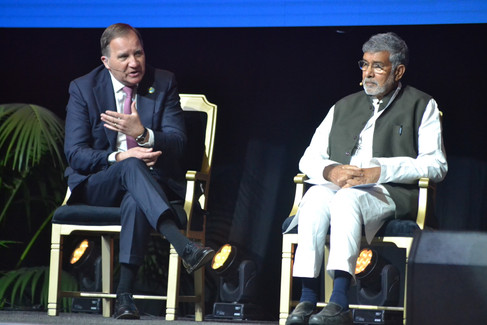
(Picture: Lucky, a child labour survivor-advocate and student activist from Ghana at the V Global Conference on the Elimination of Child Labour. Credit: ILO)
Building on four previous global conferences, the V Global Conference on the Elimination of Child Labour was held in Africa for the first time during the week of 16 to 20 May 2022, aiming to raise awareness of this injustice and identify accelerated routes to action. This conference comes at a critical time when international progress in ending child labour has stagnated. The African continent is now home to more child labourers than the rest of the world combined.
“Since our last global conference, child labour has actually increased for the first time since we started measuring at the beginning of this century,” Guy Ryder, ILO’s Director-General, at the opening ceremony.
Just three years until the deadline of the SDG target 8.7, which calls for eliminating all forms of child labour, increasing poverty and the devastating vast economic impact of COVID-19 on the world’s poorest families has further pushed another 8.9 million children into child labour.
CHILD LABOUR SURVIVOR ADVOCATES ON EVERY PLATFORM
100 Million is committed to ensuring that every major socio-political forum makes a resolution on child labour and includes the meaningful participation of child labour survivor-advocates: providing a platform to hear their truthful direct testimony and demands. These engagements aim to agree on the action between the main stakeholders to deliver policy change, rather than parallel sessions with declarations condemning child labour without specific actions, which decision-makers could easily sideline.
On the first day of the conference, alongside Nobel Laureates Kailash Satyarthi and Leymah Gbowee, World Leaders Stefan Lofven of Sweden and Thula Nxesi of South Africa, Lucky Adomba, a child labour survivor-advocate from Ghana, was a keynote speaker. This plenary session brought together champions leading the way in tackling child labour to reinvigorate international cooperation and call for commitments that will realise freedom, safety and education for every child.
Drawing from his lived experience as a former child labourer in the agriculture sector – an often hazardous sector that most child labour occurs in –and the fishing industry, Lucky shared his testimony demanding justice for children still forced to work.
Born into extreme poverty, Lucky was forced into child labour at the age of four when his mother sent him to live with a relative in a fishing village in the Volta Region of Ghana in the hope of a better life and access to education. Instead, he was introduced to fish farming, a dangerous job where he almost lost his life after falling into the River Volta. After this incident, he moved to the western region of Ghana to live with another relative. Unfortunately, he was again forced into child labour, working on cocoa farms under challenging conditions, including long hours and a heavy workload, often underpaid or unpaid.
Amplifying the voices of tens of millions of children forced into child labour, in his closing remarks, Lucky demanded that decision-makers enact rules and policies that hold people who employ children accountable.
“We must enact rules and policies that will hold people accountable should they venture indulging these young ones into child labour,” Lucky Adomba at the opening plenary.
YOUTH, STUDENT AND SURVIVOR-LED ACTION TO END CHILD LABOUR BY 2025
Young people, student leaders and survivor advocates have been on the frontlines of the effort to eliminate child labour in Africa and globally, uniting across communities and countries to defend every child’s right to be free. Despite facing unprecedented challenges, especially during the COVID-19 pandemic, they led impressive actions, initiatives and awareness campaigns to ensure their most vulnerable peers were not left behind.
From pioneering a multi-sectoral coalition to end child labour in Tanzania; input to the drafting of the current National Action plan in Uganda; raising awareness against the recruitment of children into armed groups in the Democratic Republic of Congo; developing assessment tools for measuring child labour-free communities in Ghana, and influencing significant policy outcomes at the global level. The side-event showcased the powerful role youth, student and survivor-led action play in ending child labour.
To showcase this leadership, young people, students and survivors from the 100 Million Campaign, All-Africa Students Union, Kailash Satyarthi Children’s Foundation, and Global March Against Child Labour held a hybrid side event during the V Global Conference. The side event discussed the intersectionality of injustices driving marginalisation and inequality that not only leads to child labour but also denies millions of children their right to education.
Moderated by 100 Million, the high-level interactive discussion explored the interconnected role universal social protection, ambitious policymaking and sustainable financing play in ending child labour. It also highlighted why the meaningful engagement of young people, students and survivor advocates is critical to achieving this change.

Speaking on behalf of student leaders, Samuel Sasu from All-Africa Students Union and Esther Gomani from the Southern Africa Students Union highlighted the urgent need for those campaigning to eliminate child labour and those working on the right to education to work together.
Amar Lal shared his personal story from being born into bonded labour in a stone quarry to being a Child Rights Lawyer and Activist in India. In suggesting solutions to end child labour, he called out the world’s governments' failure to provide comprehensive social protection for vulnerable children while spending an astronomical amount on military-related activities.
Nobel Laureate Leymah Gbowee amplified the need to confer genuine, democratic, youth-led organisations the same rights as the trade union movement representing workers and the employer associations representing businesses to self-organise.
Seme Ludanga, a refugee and youth activist from South Sudan, spoke on why supporting every child to be in education and not work is vital regardless of their situation. Joining the event live from Bidibidi Refugee Camp in Uganda, he emphasised the importance of expanding child-friendly schools and access to education in the refugee camps.
ACTIVE YOUTH AND CHILD CHILDREN’S PARTICIPATION AT THE CONFERENCE
For the first time, children, student leaders, youth activists, and child labour survivor-advocates were progressively engaged at the V Global Conference: from preparatory hybrid workshops to side events and thematic panels to high-level forums.
Ahead of the conference, civil society organisations working on child labour, including 100 Million, were invited to send representatives to the conference. Drawn from Africa, Latin America, and Asia, over 50 children physically participated in the main agenda and the dedicated Children and Youth Forum.
Bringing extensive experience in delivering quality, creative and interactive workshops and youth-led consultations ahead of and during high-level policy fora, youth activists from 100 Million and All Africa Students Union were facilitators of the Children and Youth Forum. They supported participants in exploring the thematic priorities of the conference in a safe, empowering space and formulating critical demands for their decision-makers.

During the last preparatory workshop, participants collated their key collective messages, incorporating the views of other children and young people across the world who took part in virtual pre-sessions in both English and Spanish. Together they drafted a Children’s Declaration to capture their unique perspectives and policy proposals targeted at all stakeholders, demanding they act urgently to end child labour.
The Children’s Declaration was presented at an interactive session on the conference's main stage, moderated by youth activists from 100 Million alongside child and youth representatives from Africa, Asia and Latin America, ILO’s senior management and the South African Government.
THE DURBAN DECLARATION
On 20th May 2022, the conference closed by adopting the ‘Durban Call to Action’.
This urgent call outlines commitments to accelerate multi-stakeholder efforts to prevent and eliminate child labour, prioritising the worst forms of child labour. Its core principles include action on making decent work a reality; protecting child labour survivors through data-driven and survivor-informed policy and pragmatic responses; realising children’s right to education; achieving universal access to social protection; and increasing financing and international cooperation for the elimination of child labour and forced labour.
The Durban Call to Action is a bold and important document that, if implemented fully at the local, national and international levels, will be transformational for the 160 million children currently working at the expense of their freedom, rights and futures. It would also be a critical lifeline for the millions of children already at risk of being forced into child labour in the next few years due to a staggering increase in global poverty and inequality.
100 Million and our global network of incredible survivor-advocates, youth activists and student leaders will continue demanding the full implementation of the Durban Call to Action and hold our governments to account for their repeated broken promises to end child labour. With just three years left to meet the SDG target 8.7 of eradicating child labour by 2025, the global community must prioritise child labour as an urgent international agenda to realise freedom, safety and education for every child.





Comments